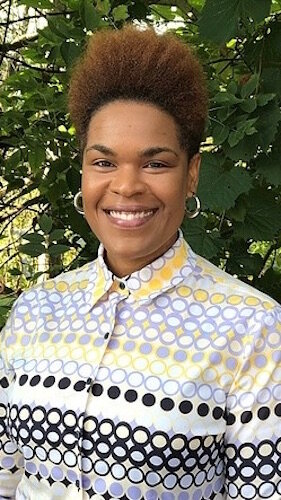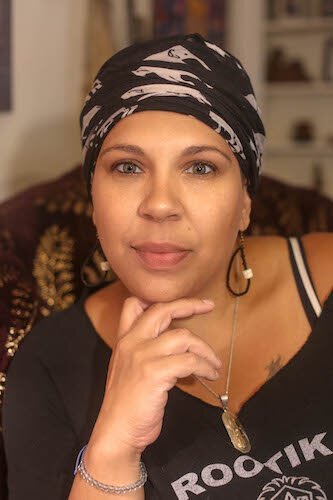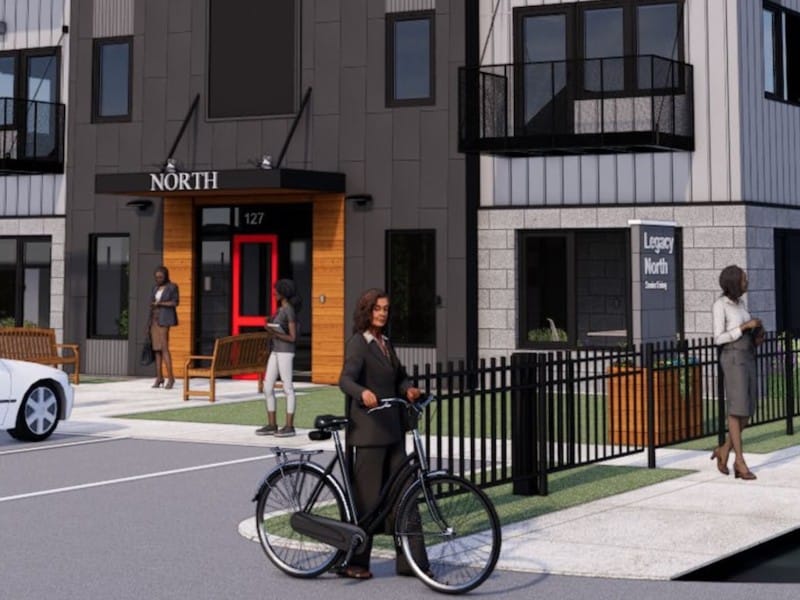New Kalamazoo area program offers access to therapy for people of color experiencing racial trauma
Truth, Racial Healing and Transformation Kalamazoo (TRHT) is partnering with Rootead Enrichment Center and local community groups to connect residents to therapists of color in order to heal racial trauma.
Editor’s note: This story is part of Southwest Michigan Second Wave’s On the Ground Kalamazoo series.
It is triggering, angering, and outright traumatic to turn on the news or scroll through social media, and see a clip of a police officer snuffing the life out of a man. Especially if you or your loved ones are of the same race or ethnicity as the man with a knee on his neck.
“That in and of itself is so major,” Dr. Kenlana Ferguson says.
But, she adds, “It’s not really new to Black and Brown people, it’s just — for everybody who experienced that, it was traumatic; for people of color, that is just another occurrence of this race-based traumatic stress.”

The year 2020 might have felt like the right time for the formation of Kalamazoo’s The Black and Brown Therapy Collective, an effort to provide people of color access to therapists to help with the emotional damages caused by racial trauma. But for many the year of George Floyd was just one more addition to many years of stress, going back to the slave trade.
“Over the years, it just adds another layer. And it can be so detrimental to the psyche,” Ferguson says. “Repeated incidences like this have not been good for our community.”
TRHT and Rootead unite for pilot program
The Black and Brown Therapy Collective is the result of a partnership of the Kalamazoo Community Foundation’s Truth, Racial Healing and Transformation, the Rootead Enrichment Center, plus other community groups. Now in its pilot program, it’s working to connect people undergoing racial trauma to therapists of color.
Ferguson says the collective has a referral list of 20 area therapists, “licensed clinicians who will be paid through our fund at their regular rate, and they will see our participants for up to four sessions.”
The collective’s goal, to address racial trauma through therapy, needed to not only provide access to clinicians, but to address the stigma mental health services have in the Black and Brown community — stigma that’s based in cultural mistrust.
During the summer, Director of TRHT Sholanna Lewis, reached out to Ferguson, psychologist and director of counseling at Kalamazoo College, to “have a conversation about the therapy needs and counseling needs for some of the individuals in our community. This was during a time where the community was dealing with not just George Floyd and COVID, but there were also some homicides happening in Kalamazoo. We recognized there were issues on top of issues on top of issues, and people were not OK,” Ferguson says.
They wanted to “address the mental health needs and challenges of folks in our community, given the times, given the history, given all the things that are going on in our country right now. Specifically Black and Brown folks.”
They reached out to local cultural healing arts center Rootead, and its director and queen doula Kama Mitchell.
Organizers held a Zoom conference with Aja Burks, organizer of the Michigan Black Therapy Fund. Burks had built a similar organization in east Michigan singlehandedly, Ferguson says. “She was really inspiring to us. So we said, ‘I think we can do this in Kalamazoo.'”
As a result, the Black and Brown Therapy Collective was developed to:
• Cover the costs of therapy for residents dealing with racial trauma for those who are not covered by insurance;
• Create a therapy referral resource to non-profits, organizers, and the broader community who are working directly with communities of color;
• Facilitate connections between Black and Brown residents and clinicians;
• Reduce mental health stigma within the Black and Brown community, increase the ability to seek help;
• Provide ongoing healing resources, make referrals to emergency services as needed; and,
• Build relationships with emergency and other mental health services to better serve people in mental health crises related to racialized trauma.
The pilot project will be open to all Black and Brown residents and there also will be specific outreach to families who have experienced gun violence. There also will be an outreach to the youth of the Fire Arts Collaborative, community advocates and organizers for racial justice; Kalamazoo Valley Community College students, and expectant parents.
Emotional and psychological injuries
From Ferguson’s point of view as a therapist, the results of racial trauma are injuries, not personality deficits nor clinical mental illness.

“Let me first say this: I see Black and Brown folk as survivors. I don’t want to talk about this from a space where there are deficits in the character — it’s not the character of the folks, it’s not deficits that we’re talking about. We’re talking about the injuries, the emotional and psychological injuries that happen as a result of living under white supremacy and with structural racism. So, what I’m seeing (as a therapist) is the impact of racism on people of color,” she says.
Racial trauma “can really make folks vulnerable to developing significant psychological issues, mental health issues,” she says. “Prolonged exposure can lead to symptoms like PTSD. You can have symptoms of depression, potentially anger — not anger within limits that are necessary and that make sense based upon the circumstances, but anger that can be detrimental to the psyche.”
She includes “recurring thoughts of the event; physical reactions to those thoughts, chest pains, insomnia, headaches. Hyper-vigilance is another. We also see issues of self-esteem, based on what in the system we’re told about ourselves, and sometimes we internalize those things and think less of ourselves — not because we think less of ourselves, but the messages that have been imposed on us, they can have a detrimental impact.”
The trauma can lead people to “disconnect from their emotional selves, and disconnect from people,” she says.
Ferguson adds one more symptom: “Fear is a big one.”
Mitchell, of Rootead, feels that this is more than just emotional trauma from the experience of one lifetime — it’s an intergenerational hurt imprinted at a cellular level.
Epigenetic theory states that stressors in earlier generations can have an impact on how genes are expressed in later generations. Meaning, if your grandparents went through tough times, you may have symptoms from their stress.
“There’s a lot of research on how stress carries through generations via the cells,” Mitchell says. “We have to address the root cause of these stressors, just as Dr. Ferguson said, and a lot of the time the root cause of a lot of these stressors is systemic, whether it be from Jim Crow or the slave trade or the Great Depression,” she says. So what’s needed is a “holistic approach on how to heal people based on where the stress came from.”
Stigma
For some, there can be a stigma with going to therapy. It can be from worries that you’ll look “weak” to be admitting you need help, or that you’ll be labeled “crazy.” But specifically for people of color, the stigma comes from the thought that they’d be seeing a therapist who hasn’t also faced life as an African American in the U.S.
“Absolutely. What we have is cultural mistrust, for sure. And that’s a result of white supremacy, right?” Ferguson says.
“And we have history. We have mistrust that comes from incidents of being oppressed, of being harmed through our mental health systems. And that’s transmitted generationally as mistrust. We can take this all the way back to slavery.”
The mistrust is warranted, she says. “And I think we’ve not done enough to restore and repair as clinicians, as health care providers, to let folks know that we can be safe. Not all are safe, but we can be safe.”
Mitchell says she feels that many therapists are too stuck to psychological theories based in Western culture.
“So much of Western psychology comes from Western thought processes and Western minds,” Mitchell says. It’s important for therapists to have “openness around folks who show up with different perspectives, different cultures…. ”
“Let’s say, the Jungian method says this is how we have to go through therapy, but that doesn’t take into account different cultures or ways of being. So how do we undo that?”
To help people of color heal from trauma, it’s important to have “access to therapists that are a reflection, maybe have the same culture or the same point of view in life,” Mitchell says. “There are so many different facets to being a better therapist for other bodies of culture. And/or making sure we’re connecting certain bodies of culture that are reflective. Representation really matters.”
Therapy through talk, through dance
Mitchell adds that a big reason why she wanted Rootead to be a major partner in the collective is to bring non-Western forms of therapy to the table.
Rootead specializes in using art, and specifically movement and dance, as therapy. “For eons, bodies of culture, other indigenous peoples, Native Americans, Latinx people, Black people, have used movement as therapy. Moving their bodies to pull the trauma out, or the pain or the emotion out,” she says. “It’s something that we really lean into at Rootead, it’s something we’d like to see added in offerings in the future when this becomes an ongoing offering to the community.”
And being able to open up to a non-judgmental ear can help heal, Ferguson says.
“Therapy has been called ‘the talking cure,’ so there’s also the element of being able to share with somebody and be heard, and release. And I don’t think there are always safe spaces for people of color to release whatever it is that they’re feeling without being judged or criticized…. People of color need outlets, and therapy provides that.”
She gives an example of a client who says they feel anger. Anger can be justified, but it can also have a harmful impact on one’s life.
“Like, they would say, ‘I’m just angry.’ So, describe the anger,” she might ask this client. “Who said you were angry? Who said you can’t be angry? We ask questions like that, to get at, is this actually what I believe about myself or know about myself or my internal experience? Or are these things that have been placed on me, and I’ve been taught to believe about myself, and then be critical or judgmental about myself based upon that?”
It’s an approach that’s different than “just identifying the anger or labeling the anger as a symptom of some diagnosable mental health issue,” Ferguson says.
“When we’re talking about healing racial trauma — a big part of it is, folks need to feel safe, and feeling safe means that your humanity is honored, you are listened to, you are heard, you are respected, your feelings are validated. You could be your whole self, and empathy is given, grace is given, support is given, and those are just conditions, right? Those are necessary when you are talking about people who’ve been harmed and oppressed and marginalized. So you create that space and that sense of safety for folks. And then you help them start that intentional work that they need to do to be whole,” she says.















